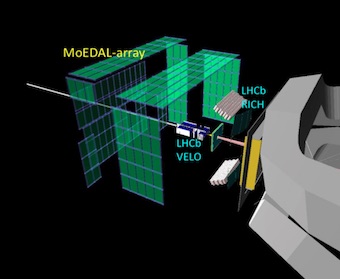
Representatives of the 24 scientific institutions from all over the world participating in the experiment at CERN’s Large Hadron Collider (LHC), which searches for magnetic monopole, to meet in the UV’s Parc Científic on 28 and 29 of June. It is the first time that the Institute of Corpuscular Physics (IFIC, CSIC-UV), the only Spanish institution taking part in the LHC experiment, organises the scientific meeting to which Vice-Principal for Research and Science Policy, Pilar Campins, will attend.
It is the 5th MoEDAL Collaboration meeting, a series of meetings which started in 2012. The meeting, organised by IFIC, is attended by representatives of the 24 scientific institutions coming from 12 countries which formed the collaboration, totalling 70 scientists. The organization has IFIC’s support through the ‘Severo Ochoa’ center of excellence programme, and will have representatives from the Valencian government (Generalitat Valenciana), which financially supports the participation of the group, as well as the Universitat de València in the opening.
The MoEDAL experiment is a passive detector located next to the LHCb experiment, another LHC experiment in which IFIC participates and that studies the differences between matter and antimatter. MoEDAL searches the first detection of a particle proposed by Paul Dirac in the 30’s: magnetic monopoles.
This theoretical physicist suggested that magnetism might be a property of the elementary particles, so that, just as electrons are negatively charged and protons, positively, there would be a type of particle consisting of only one magnetic pole (a north pole without a south pole or viceversa): the so-called ‘magnetic monopoles’. The LHC MoEDAL experiment is specifically designed to search for them.
Furthermore, thanks to its capacity to detect highly ionizing particles, MoEDAL can explore a broad range of massive electric charged particles and stable or metastable. These states appear in several theorical models such as the Supersymmetry, theories with extra dimension and some sceneries which predict multiple-particle states.
The meeting, which takes place in the Salón de Actos of the main building at UV’s Parc Científic, offers the Open Session on Tuesday 28 June in which theories predicting the existence of magnetic monopoles and provide forms of detecting them are to be presented. The afternoon of the 28th and the next day are reserved for the members of MoEDAL Collaboration, whose managing board is currently presided by IFIC researcher Vasiliki Mitsou.
Among the topics to be dealt with, the first results of the experiment analysed in 2015 will be presented; the open possibilities with the LHC current operating cycle, which has increased the amount of collisions, and thus, its capacity to find new particles; technical aspects of the detectors and the software which has been used for the simulation of these new particles and the detectors’ data reading; as well as the organizational aspects.
More information:
https://indico.cern.ch/event/493401/overview
http://moedal.web.cern.ch/
Last update: 27 de june de 2016 12:00.
News release


















